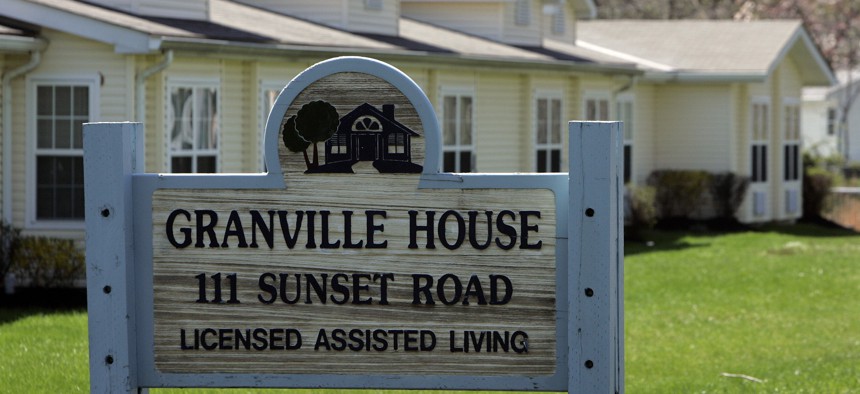Federal Watchdog: State Reporting Gaps Limit Assisted Living Oversight

The Granville House assisted living facility is seen Thursday, April 16, 2009, in Burlington, N.J. AP Photo/Mel Evans

Connecting state and local government leaders
"This report finds that thousands of seniors face serious health and safety risks in their assisted living facilities,” Sen. Elizabeth Warren said of the Government Accountability Office findings.
WASHINGTON — A federal watchdog agency has identified troubling shortfalls with how states are tracking and reporting incidents that could expose seniors and people with disabilities to harm and risks while they are receiving assisted living care.
The Government Accountability Office released the findings Monday in a report that looked specifically at assisted living services funded through Medicaid, the federal-state program that covers health care costs for low-income Americans and people with disabilities.
Assisted living offers an alternative to facilities like nursing homes. It can instead provide people who are older or disabled a way to live in a house or apartment, while getting help with a range of tasks—for instance: bathing, traveling, and preparing meals.
State Medicaid agencies in 48 states that covered assisted living services reported spending more than $10 billion of combined federal and state funding on the services in 2014, according to GAO.
These services involved over 330,000 beneficiaries and 130 different programs.
The state Medicaid agencies are required to have systems in place for monitoring so-called “critical incidents,” involving assisted living problems like abuse, neglect and exploitation.
But 26 agencies were unable to tell GAO how many critical incidents occurred during 2014. The 22 states that did share critical incident figures for that year reported 22,921 incidents.
Specific critical incidents can involve physical, emotional or sexual abuse, unexplained deaths, the unauthorized use of restraints, or errors giving people medication.
GAO also found, however, that states do not all follow the same standards for what types of incidents are classified as “critical.” For instance, suspected criminal activity by a provider was only considered a critical incident in 40 of the 48 states GAO looked at.
“This report finds that thousands of seniors face serious health and safety risks in their assisted living facilities,” Sen. Elizabeth Warren, a Massachusetts Democrat who was among a bipartisan group of senators who requested the report in 2015, said in a statement.
“Medicaid spends billions of dollars to provide this care—and we need to make sure we have the information necessary to ensure accountability,” she added. “I plan to pursue legislation to address these groundbreaking findings.”
GAO also notes that states differ when it comes to making information about critical incidents at specific facilities publicly available. As of 2014, in some states this information was only available by phone or in person, but not online. And, in 14 states, information about critical incidents at particular facilities was not readily available to the public.
In general, states establish their own licensing and oversight guidelines for assisted living facilities, the report points out. "In contrast," it adds, "nursing homes must meet a comprehensive set of federal requirements in order to receive payment for long-term care services for Medicaid and Medicare beneficiaries."
The Centers for Medicare and Medicaid Services is charged with federal oversight of state Medicaid programs. Among GAO’s recommendations for the agency is to clarify assisted living reporting requirements and to provide additional guidance for states.
The other senators who called for the report included Finance Committee Chairman Orrin Hatch, a Utah Republican; Susan Collins, a Maine Republican; and Claire McCaskill, a Missouri Democrat.
Hatch said in a statement: “Today’s report underscores the importance of improved reporting at assisted living facilities and starts the conversation on how we can make it better.”
Bill Lucia is a Senior Reporter for Government Executive’s Route Fifty and is based in Washington, D.C.

NEXT STORY: Seema Verma: Medicaid Work Requirements Are ‘True Compassion’





